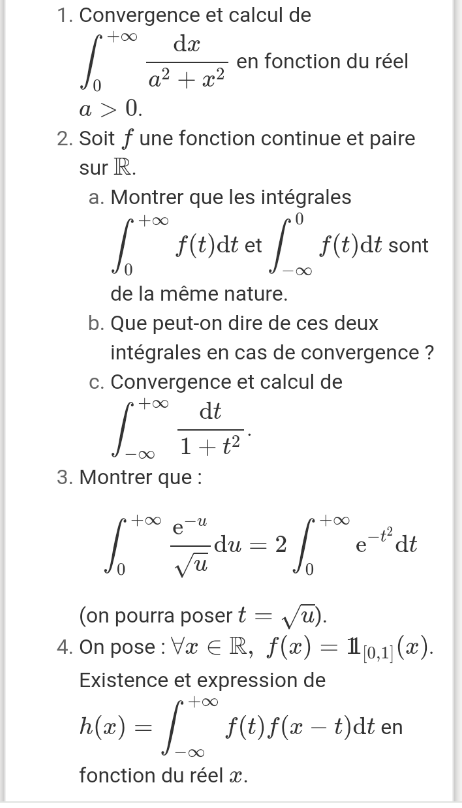Question Number 160873 by SANOGO last updated on 08/Dec/21

Answered by TheSupreme last updated on 08/Dec/21

$$\left.\mathrm{1}\right)\:\int_{\mathrm{0}} ^{\infty} \frac{\mathrm{1}}{{a}^{\mathrm{2}} }\frac{{dx}}{\mathrm{1}+\left(\frac{{x}}{{a}}\right)^{\mathrm{2}} }=\frac{\mathrm{1}}{{a}}{arctan}\frac{{x}}{{a}}=\frac{\pi}{\mathrm{2}{a}} \\ $$
Commented by SANOGO last updated on 08/Dec/21

$${merci}\:{vu}\:{stp}\:{le}\:{reste} \\ $$
Answered by puissant last updated on 13/Dec/21
![2−c) ∫_(−∞) ^(+∞) (dt/(1+t^2 )) = 2∫_0 ^∞ (dt/(1+t^2 )) = 2[arctan(t)]_0 ^∞ =π. 3. ∫_0 ^∞ (e^(−u) /( (√u))) du ; posons u=t^2 ⇒ du=2tdt ⇒ ∫_0 ^∞ (e^(−t^2 ) /t)2tdt = 2∫_0 ^∞ e^(−t^2 ) dt..](https://www.tinkutara.com/question/Q161172.png)
$$\left.\mathrm{2}−{c}\right) \\ $$$$\int_{−\infty} ^{+\infty} \frac{{dt}}{\mathrm{1}+{t}^{\mathrm{2}} }\:=\:\mathrm{2}\int_{\mathrm{0}} ^{\infty} \frac{{dt}}{\mathrm{1}+{t}^{\mathrm{2}} }\:=\:\mathrm{2}\left[{arctan}\left({t}\right)\right]_{\mathrm{0}} ^{\infty} =\pi. \\ $$$$\mathrm{3}. \\ $$$$\int_{\mathrm{0}} ^{\infty} \frac{{e}^{−{u}} }{\:\sqrt{{u}}}\:{du}\:;\:\:\:{posons}\:\:{u}={t}^{\mathrm{2}} \:\Rightarrow\:{du}=\mathrm{2}{tdt} \\ $$$$\Rightarrow\:\int_{\mathrm{0}} ^{\infty} \frac{{e}^{−{t}^{\mathrm{2}} } }{{t}}\mathrm{2}{tdt}\:=\:\mathrm{2}\int_{\mathrm{0}} ^{\infty} {e}^{−{t}^{\mathrm{2}} } {dt}.. \\ $$
